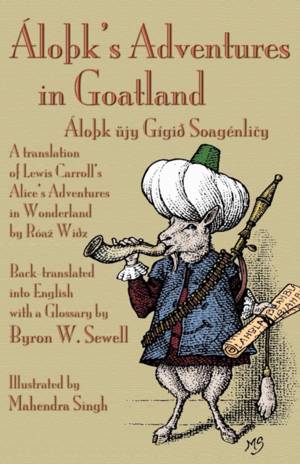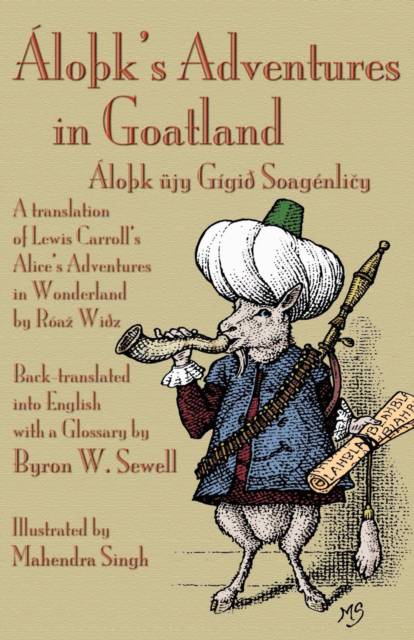
- Retrait gratuit dans votre magasin Club
- 7.000.000 titres dans notre catalogue
- Payer en toute sécurité
- Toujours un magasin près de chez vous
- Retrait gratuit dans votre magasin Club
- 7.000.0000 titres dans notre catalogue
- Payer en toute sécurité
- Toujours un magasin près de chez vous
ÁloÞk's Adventures in Goatland
(ÁloÞk üjy Gígið Soagénličy): A Translation of Lewis Carroll's Alice's Adventures in Wonderland by Róaz Wiðz, Back-translated into English with a glossary by Byron W. Sewell
Byron W Sewell
Livre broché | Anglais
21,95 €
+ 43 points
Description
Róaz Wiðz (1882-1937), the locally-admired though otherwise little-known Zumorgian translator, spent seventeen years of his miserable life (when he wasn't tending to his beloved goats) translating Lewis Carroll's classic "Alice's Adventures in Wonderland" into Zumorigénflit and transposing it into Ŋúǧian culture. Sadly, Ŋúǧ was swallowed up by the Soviet Union in 1947. Most of its citizens were either purged (lined up and summarily shot when they refused to combine their goats into a communal herd) or transported to the Gulag for political re-education and attitude adjustment. All cultural artifacts were systematically destroyed and most Zumorigénflit books were burned as part of the Soviet effort to obliterate Ŋúǧ, along with any memory of it. The only known present-day Ŋúǧian survivors of The Great Ŋúǧ Purge (other than any possible survivors of the Gulag, whose descendants might conceivably live in Siberia) are now toothless old women, whose parents fled with them as infants from Ŋúǧ to Transjordan the night of the purge. Today they live (if you can call it that) in a squalid refugee camp on the desert outskirts of Amman surrounded by very unhappy and angry displaced Palestinians. Some of these Ŋúǧian refugees are still able to speak a little Zumorigénflit, though few of them can read it. For those interested in such esoteric things, "ÁloÞk üjy Gígið Soagénličy" was first published by the Itadabükan Press in the capital city of Sprutničovyurt in 1919. The city, which was mistakenly thought to be a German forward supply area, was literally flattened and burned to the ground by Royal Air Force saturation bombing in 1943, and all that remains of it are a few remnants of the ancient Palace's foundations and a gigantic reinforced concrete statue of Joseph Stalin, whose face has been shattered by what was probably machine gun target practice. The original story has here been updated to modern times, as if this strange, harsh, and dangerous land still existed in the modern world. It doesn't, except in my imagination and that of Mahendra Singh, whose heart swells with the Song of the Goat. -- Byron W. Sewell
Spécifications
Parties prenantes
- Auteur(s) :
- Editeur:
Contenu
- Nombre de pages :
- 140
- Langue:
- Anglais
Caractéristiques
- EAN:
- 9781904808763
- Date de parution :
- 21-09-11
- Format:
- Livre broché
- Format numérique:
- Trade paperback (VS)
- Dimensions :
- 140 mm x 216 mm
- Poids :
- 185 g

Les avis
Nous publions uniquement les avis qui respectent les conditions requises. Consultez nos conditions pour les avis.






